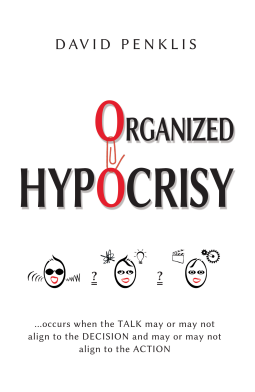
Organized Hypocrisy
by David Penklis
This title was previously available on NetGalley and is now archived.
Send NetGalley books directly to your Kindle or Kindle app
1
To read on a Kindle or Kindle app, please add kindle@netgalley.com as an approved email address to receive files in your Amazon account. Click here for step-by-step instructions.
2
Also find your Kindle email address within your Amazon account, and enter it here.
Pub Date 28 Apr 2024 | Archive Date 17 May 2024
Talking about this book? Use #OrganizedHypocrisy #NetGalley. More hashtag tips!
Description
Organized Hypocrisy is the disconnect between talk, decision-making, and action by multiple actors and is evident in our daily lives and part of our DNA. We cannot ignore or avoid it. It occurs globally in international politics, within a nation-state by its government, and by corporate and government organizations. Significant scandals are connected to organized hypocrisy, such as the VW and Enron scandals, and it is in international climate change discussions, nation-state elections, and proven to be evident in renowned organizations such as the African Union, UNICEF, and the World Bank.
This book provides an in-depth understanding of organized hypocrisy by breaking down the concept and its many components. Intriguing and interesting case studies provide evidence of the prevalence and reasons for organized hypocrisy. The case studies cover climate change, foreign policy and arms control, state-building, government corruption, BREXIT, membership to the EU, human rights, Enron corporate reporting, General Electric silence, VW defective cars, the African Union, World Bank, and much more. This book demonstrates that organized hypocrisy is being used strategically across the globe and is part of our daily lives and, essentially, our DNA.
A Note From the Publisher
Available Editions
| EDITION | Ebook |
| ISBN | 9781805148548 |
| PRICE | £9.99 (GBP) |
| PAGES | 336 |
Available on NetGalley
Featured Reviews
 J. K, Reviewer
J. K, Reviewer
Thanks to the publisher and Netgalley for this eARC.
David Penklis’s Organized Hypocrisy delves into the intricate web of contradictions that permeate our global landscape. With meticulous analysis and compelling case studies, Penklis exposes the disconnect between rhetoric, decision-making, and action—a phenomenon he aptly terms “organized hypocrisy.”
Synopsis: In this thought-provoking work, Penklis dissects the concept of organized hypocrisy, revealing its prevalence across international politics, corporate structures, and government institutions. From climate change negotiations to state-building endeavors, the book unearths instances where talk and action diverge, leaving us questioning the authenticity of our leaders’ promises.
Key Insights:
Strategic Use: Organized hypocrisy isn’t accidental; it’s a calculated strategy employed by actors worldwide. Whether it’s the silence of corporations like General Electric or the flawed reporting by Enron, Penklis demonstrates how this phenomenon shapes our daily lives.
Scandals and Institutions: The VW and Enron scandals serve as stark examples of organized hypocrisy. But it’s not limited to the corporate realm; renowned organizations like the African Union, UNICEF, and the World Bank also grapple with this paradox.
DNA of Hypocrisy: Penklis argues that organized hypocrisy is ingrained in our DNA. It’s part of the fabric of governance, decision-making, and discourse. We cannot ignore it; we must confront it.
Thought-Provoking Case Studies:
Climate Change: How do nations’ commitments align with their actions? Penklis dissects climate change negotiations, revealing the gap between promises and implementation.
BREXIT: The UK’s departure from the EU exemplifies organized hypocrisy—political maneuvering versus tangible outcomes.
Human Rights: Despite lofty declarations, human rights violations persist globally. Organized hypocrisy thrives in this arena.
Corporate Failures: Enron’s deceptive reporting and VW’s defective cars highlight the chasm between words and deeds.
Penklis’s prose is accessible yet intellectually stimulating. His blend of theory and real-world examples keeps readers engaged. As a book reviewer, I appreciate the clarity and depth he brings to complex concepts.
Organized Hypocrisy is a must-read for anyone intrigued by the intricacies of power, ethics, and accountability. Penklis’s insights challenge us to question the narratives we encounter daily. Whether you’re a seasoned political observer or a curious reader, this book offers fresh perspectives on the human condition.
David Penklis’s Organized Hypocrisy sheds light on the shadows of our systems, urging us to confront the paradoxes that shape our world. Prepare to be enlightened, provoked, and inspired. 📚🌟
 Reviewer 1205018
Reviewer 1205018
Organised Hypocrisy serves as a comprehensive source for anyone looking to delve deep into the intricacies of organizational contradictions—why one thing is said and another is done. Diving deep into different theories, with many case studies and copious citations, the book revisits ideas previously discussed in the field and consolidates a vast array of information into one accessible location.
Written with the meticulousness of a senior thesis, it systematically presents synopses of key sources, though it would benefit from more original analysis and a sprinkling of practical applications or narrative links. Its an art to bring large facts together into a narrative that explains the world, and this text only reaches that occasionally. The current in-line citation style clutters the flow a bit, so footnotes might be a neat trick for smoother reading in future editions.
This book is ideal for those who appreciate a thorough exploration of the subject or as an educational resource for dedicated learners eager to understand every facet of organizational challenges.
I'm very grateful to the publisher and author for letting me read this book early.
Readers who liked this book also liked:
Michelle Dominguez Greene
General Fiction (Adult), Mystery & Thrillers, True Crime


















